Impact of Hospitalisation: Acute to Chronic Illnesses in Patients
VerifiedAdded on 2021/02/20
|6
|1519
|106
Report
AI Summary
This report investigates the impact of hospitalisation on patients and their families admitted for acute to chronic illnesses, using a case study of a 70+ year old woman with brain cancer. It explores the challenges faced during hospitalisation, including forgetfulness, confusion, loss of patience, and the need for interprofessional teams. The report highlights the roles of oncologists, neurologists, nurse practitioners, and other team members in providing patient-centered care. It also addresses discharge planning, the importance of management plans, and the impact of these plans on the patient and their family. Recommendations include involving social workers and palliative care specialists to improve patient outcomes. This report is available on Desklib, which provides access to past papers and solved assignments for students.
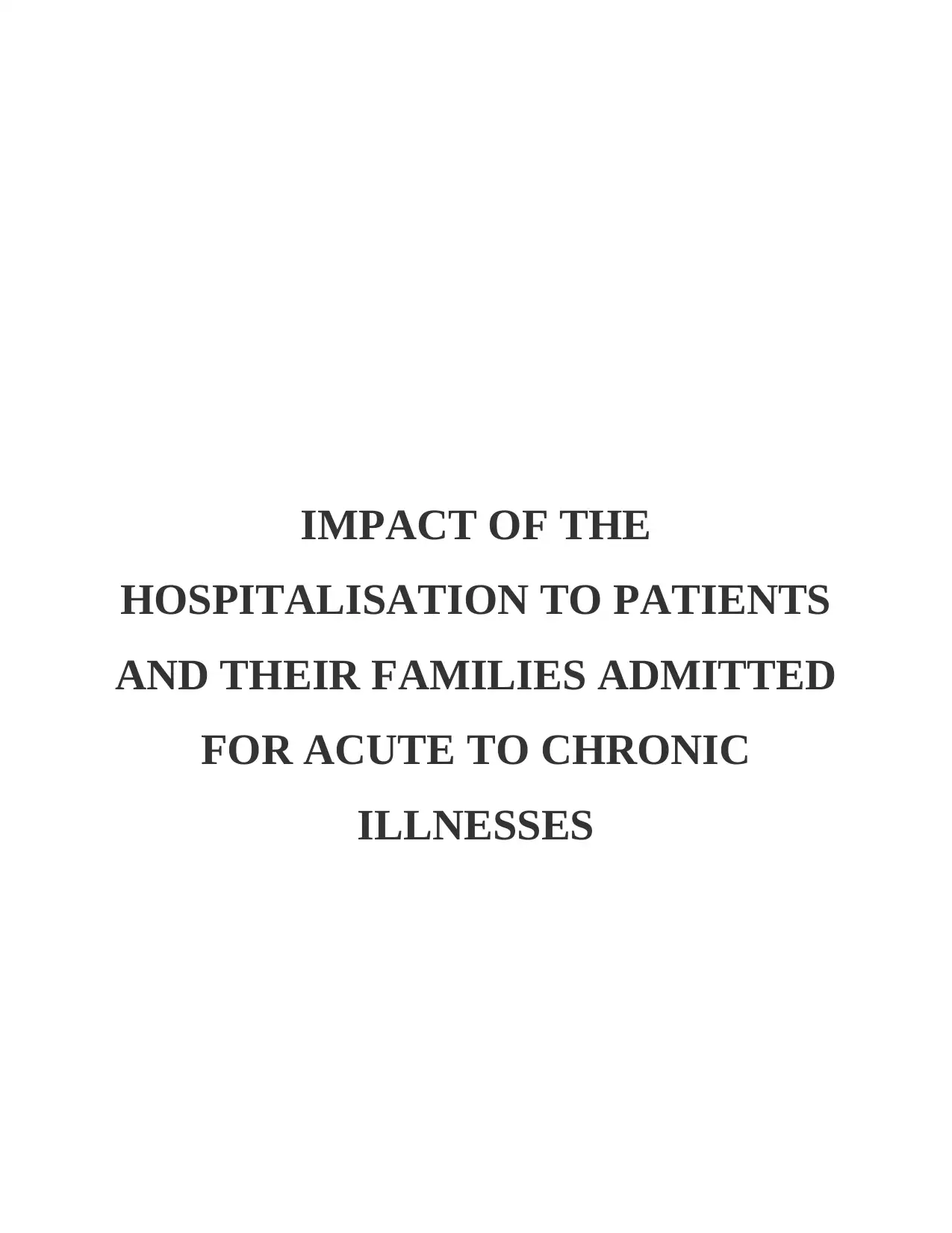
IMPACT OF THE
HOSPITALISATION TO PATIENTS
AND THEIR FAMILIES ADMITTED
FOR ACUTE TO CHRONIC
ILLNESSES
HOSPITALISATION TO PATIENTS
AND THEIR FAMILIES ADMITTED
FOR ACUTE TO CHRONIC
ILLNESSES
Paraphrase This Document
Need a fresh take? Get an instant paraphrase of this document with our AI Paraphraser
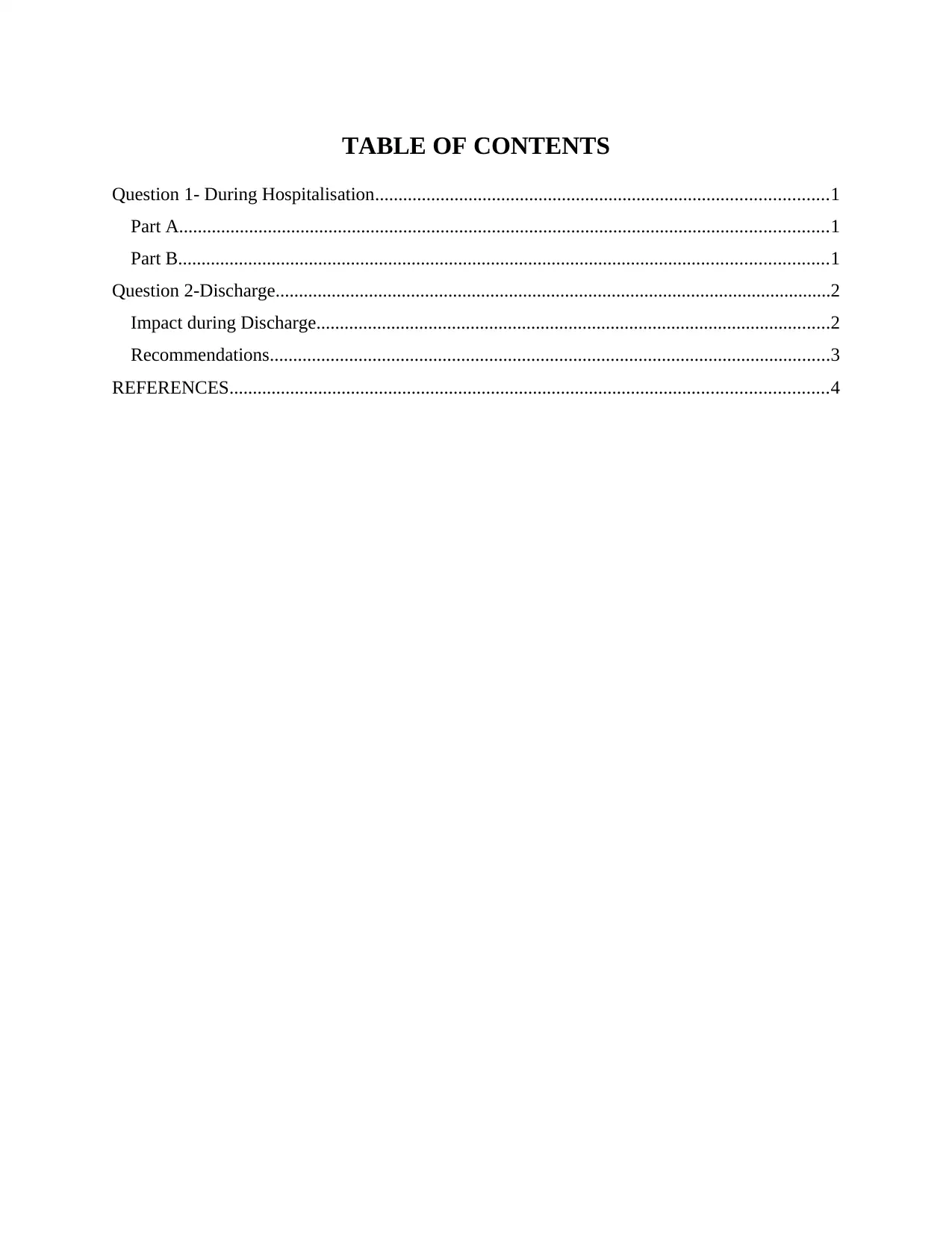
TABLE OF CONTENTS
Question 1- During Hospitalisation.................................................................................................1
Part A...........................................................................................................................................1
Part B...........................................................................................................................................1
Question 2-Discharge.......................................................................................................................2
Impact during Discharge..............................................................................................................2
Recommendations........................................................................................................................3
REFERENCES................................................................................................................................4
Question 1- During Hospitalisation.................................................................................................1
Part A...........................................................................................................................................1
Part B...........................................................................................................................................1
Question 2-Discharge.......................................................................................................................2
Impact during Discharge..............................................................................................................2
Recommendations........................................................................................................................3
REFERENCES................................................................................................................................4
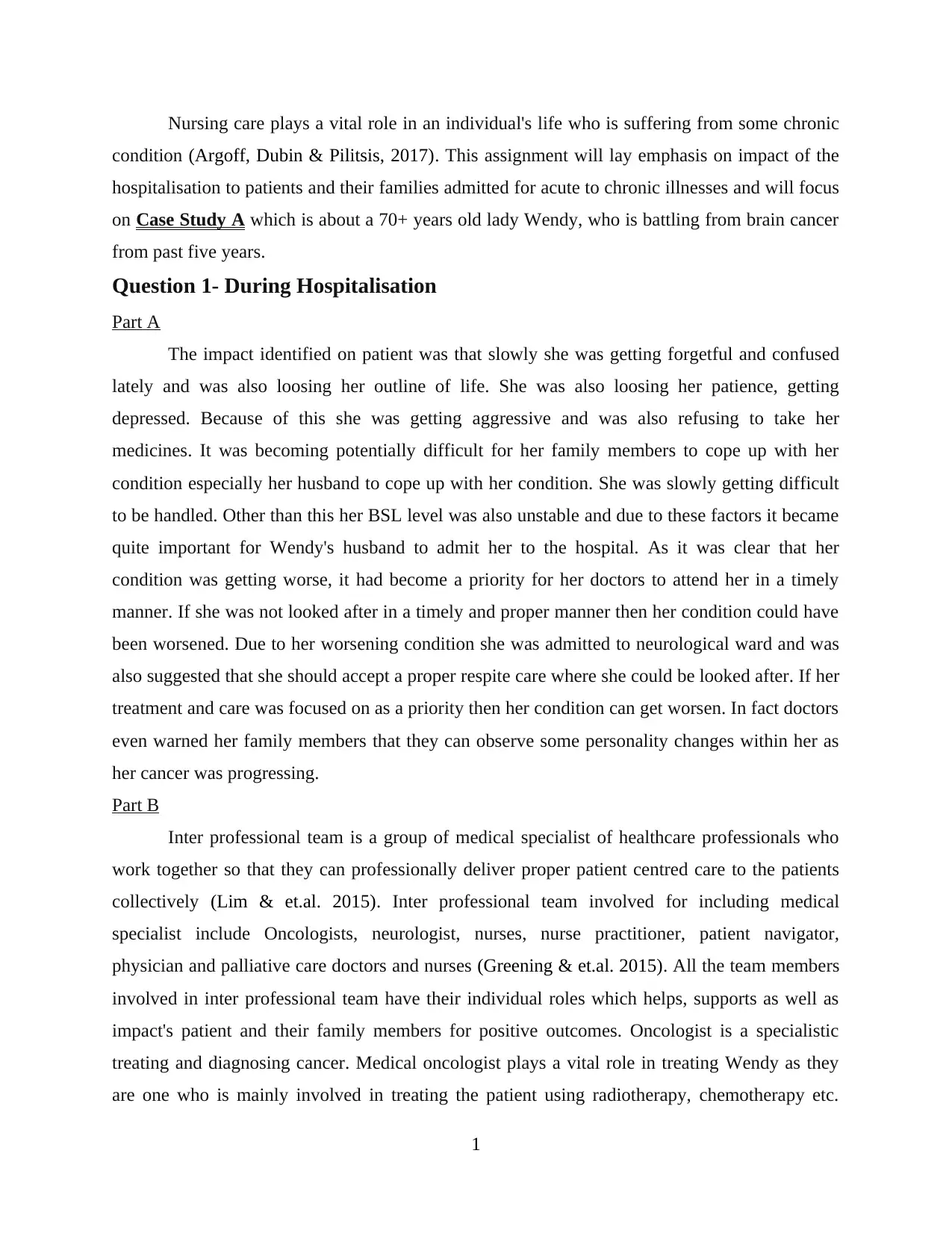
Nursing care plays a vital role in an individual's life who is suffering from some chronic
condition (Argoff, Dubin & Pilitsis, 2017). This assignment will lay emphasis on impact of the
hospitalisation to patients and their families admitted for acute to chronic illnesses and will focus
on Case Study A which is about a 70+ years old lady Wendy, who is battling from brain cancer
from past five years.
Question 1- During Hospitalisation
Part A
The impact identified on patient was that slowly she was getting forgetful and confused
lately and was also loosing her outline of life. She was also loosing her patience, getting
depressed. Because of this she was getting aggressive and was also refusing to take her
medicines. It was becoming potentially difficult for her family members to cope up with her
condition especially her husband to cope up with her condition. She was slowly getting difficult
to be handled. Other than this her BSL level was also unstable and due to these factors it became
quite important for Wendy's husband to admit her to the hospital. As it was clear that her
condition was getting worse, it had become a priority for her doctors to attend her in a timely
manner. If she was not looked after in a timely and proper manner then her condition could have
been worsened. Due to her worsening condition she was admitted to neurological ward and was
also suggested that she should accept a proper respite care where she could be looked after. If her
treatment and care was focused on as a priority then her condition can get worsen. In fact doctors
even warned her family members that they can observe some personality changes within her as
her cancer was progressing.
Part B
Inter professional team is a group of medical specialist of healthcare professionals who
work together so that they can professionally deliver proper patient centred care to the patients
collectively (Lim & et.al. 2015). Inter professional team involved for including medical
specialist include Oncologists, neurologist, nurses, nurse practitioner, patient navigator,
physician and palliative care doctors and nurses (Greening & et.al. 2015). All the team members
involved in inter professional team have their individual roles which helps, supports as well as
impact's patient and their family members for positive outcomes. Oncologist is a specialistic
treating and diagnosing cancer. Medical oncologist plays a vital role in treating Wendy as they
are one who is mainly involved in treating the patient using radiotherapy, chemotherapy etc.
1
condition (Argoff, Dubin & Pilitsis, 2017). This assignment will lay emphasis on impact of the
hospitalisation to patients and their families admitted for acute to chronic illnesses and will focus
on Case Study A which is about a 70+ years old lady Wendy, who is battling from brain cancer
from past five years.
Question 1- During Hospitalisation
Part A
The impact identified on patient was that slowly she was getting forgetful and confused
lately and was also loosing her outline of life. She was also loosing her patience, getting
depressed. Because of this she was getting aggressive and was also refusing to take her
medicines. It was becoming potentially difficult for her family members to cope up with her
condition especially her husband to cope up with her condition. She was slowly getting difficult
to be handled. Other than this her BSL level was also unstable and due to these factors it became
quite important for Wendy's husband to admit her to the hospital. As it was clear that her
condition was getting worse, it had become a priority for her doctors to attend her in a timely
manner. If she was not looked after in a timely and proper manner then her condition could have
been worsened. Due to her worsening condition she was admitted to neurological ward and was
also suggested that she should accept a proper respite care where she could be looked after. If her
treatment and care was focused on as a priority then her condition can get worsen. In fact doctors
even warned her family members that they can observe some personality changes within her as
her cancer was progressing.
Part B
Inter professional team is a group of medical specialist of healthcare professionals who
work together so that they can professionally deliver proper patient centred care to the patients
collectively (Lim & et.al. 2015). Inter professional team involved for including medical
specialist include Oncologists, neurologist, nurses, nurse practitioner, patient navigator,
physician and palliative care doctors and nurses (Greening & et.al. 2015). All the team members
involved in inter professional team have their individual roles which helps, supports as well as
impact's patient and their family members for positive outcomes. Oncologist is a specialistic
treating and diagnosing cancer. Medical oncologist plays a vital role in treating Wendy as they
are one who is mainly involved in treating the patient using radiotherapy, chemotherapy etc.
1
⊘ This is a preview!⊘
Do you want full access?
Subscribe today to unlock all pages.

Trusted by 1+ million students worldwide
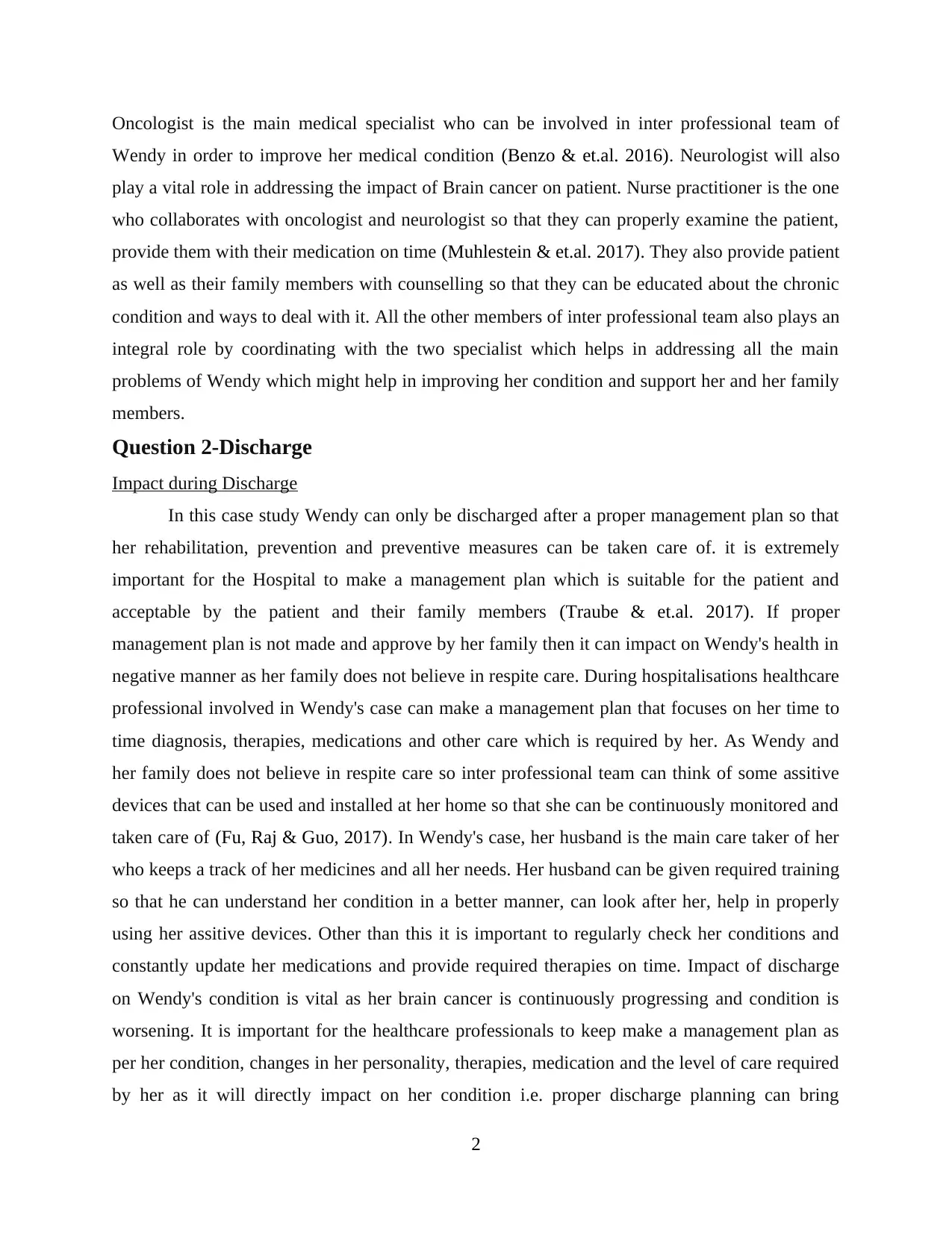
Oncologist is the main medical specialist who can be involved in inter professional team of
Wendy in order to improve her medical condition (Benzo & et.al. 2016). Neurologist will also
play a vital role in addressing the impact of Brain cancer on patient. Nurse practitioner is the one
who collaborates with oncologist and neurologist so that they can properly examine the patient,
provide them with their medication on time (Muhlestein & et.al. 2017). They also provide patient
as well as their family members with counselling so that they can be educated about the chronic
condition and ways to deal with it. All the other members of inter professional team also plays an
integral role by coordinating with the two specialist which helps in addressing all the main
problems of Wendy which might help in improving her condition and support her and her family
members.
Question 2-Discharge
Impact during Discharge
In this case study Wendy can only be discharged after a proper management plan so that
her rehabilitation, prevention and preventive measures can be taken care of. it is extremely
important for the Hospital to make a management plan which is suitable for the patient and
acceptable by the patient and their family members (Traube & et.al. 2017). If proper
management plan is not made and approve by her family then it can impact on Wendy's health in
negative manner as her family does not believe in respite care. During hospitalisations healthcare
professional involved in Wendy's case can make a management plan that focuses on her time to
time diagnosis, therapies, medications and other care which is required by her. As Wendy and
her family does not believe in respite care so inter professional team can think of some assitive
devices that can be used and installed at her home so that she can be continuously monitored and
taken care of (Fu, Raj & Guo, 2017). In Wendy's case, her husband is the main care taker of her
who keeps a track of her medicines and all her needs. Her husband can be given required training
so that he can understand her condition in a better manner, can look after her, help in properly
using her assitive devices. Other than this it is important to regularly check her conditions and
constantly update her medications and provide required therapies on time. Impact of discharge
on Wendy's condition is vital as her brain cancer is continuously progressing and condition is
worsening. It is important for the healthcare professionals to keep make a management plan as
per her condition, changes in her personality, therapies, medication and the level of care required
by her as it will directly impact on her condition i.e. proper discharge planning can bring
2
Wendy in order to improve her medical condition (Benzo & et.al. 2016). Neurologist will also
play a vital role in addressing the impact of Brain cancer on patient. Nurse practitioner is the one
who collaborates with oncologist and neurologist so that they can properly examine the patient,
provide them with their medication on time (Muhlestein & et.al. 2017). They also provide patient
as well as their family members with counselling so that they can be educated about the chronic
condition and ways to deal with it. All the other members of inter professional team also plays an
integral role by coordinating with the two specialist which helps in addressing all the main
problems of Wendy which might help in improving her condition and support her and her family
members.
Question 2-Discharge
Impact during Discharge
In this case study Wendy can only be discharged after a proper management plan so that
her rehabilitation, prevention and preventive measures can be taken care of. it is extremely
important for the Hospital to make a management plan which is suitable for the patient and
acceptable by the patient and their family members (Traube & et.al. 2017). If proper
management plan is not made and approve by her family then it can impact on Wendy's health in
negative manner as her family does not believe in respite care. During hospitalisations healthcare
professional involved in Wendy's case can make a management plan that focuses on her time to
time diagnosis, therapies, medications and other care which is required by her. As Wendy and
her family does not believe in respite care so inter professional team can think of some assitive
devices that can be used and installed at her home so that she can be continuously monitored and
taken care of (Fu, Raj & Guo, 2017). In Wendy's case, her husband is the main care taker of her
who keeps a track of her medicines and all her needs. Her husband can be given required training
so that he can understand her condition in a better manner, can look after her, help in properly
using her assitive devices. Other than this it is important to regularly check her conditions and
constantly update her medications and provide required therapies on time. Impact of discharge
on Wendy's condition is vital as her brain cancer is continuously progressing and condition is
worsening. It is important for the healthcare professionals to keep make a management plan as
per her condition, changes in her personality, therapies, medication and the level of care required
by her as it will directly impact on her condition i.e. proper discharge planning can bring
2
Paraphrase This Document
Need a fresh take? Get an instant paraphrase of this document with our AI Paraphraser
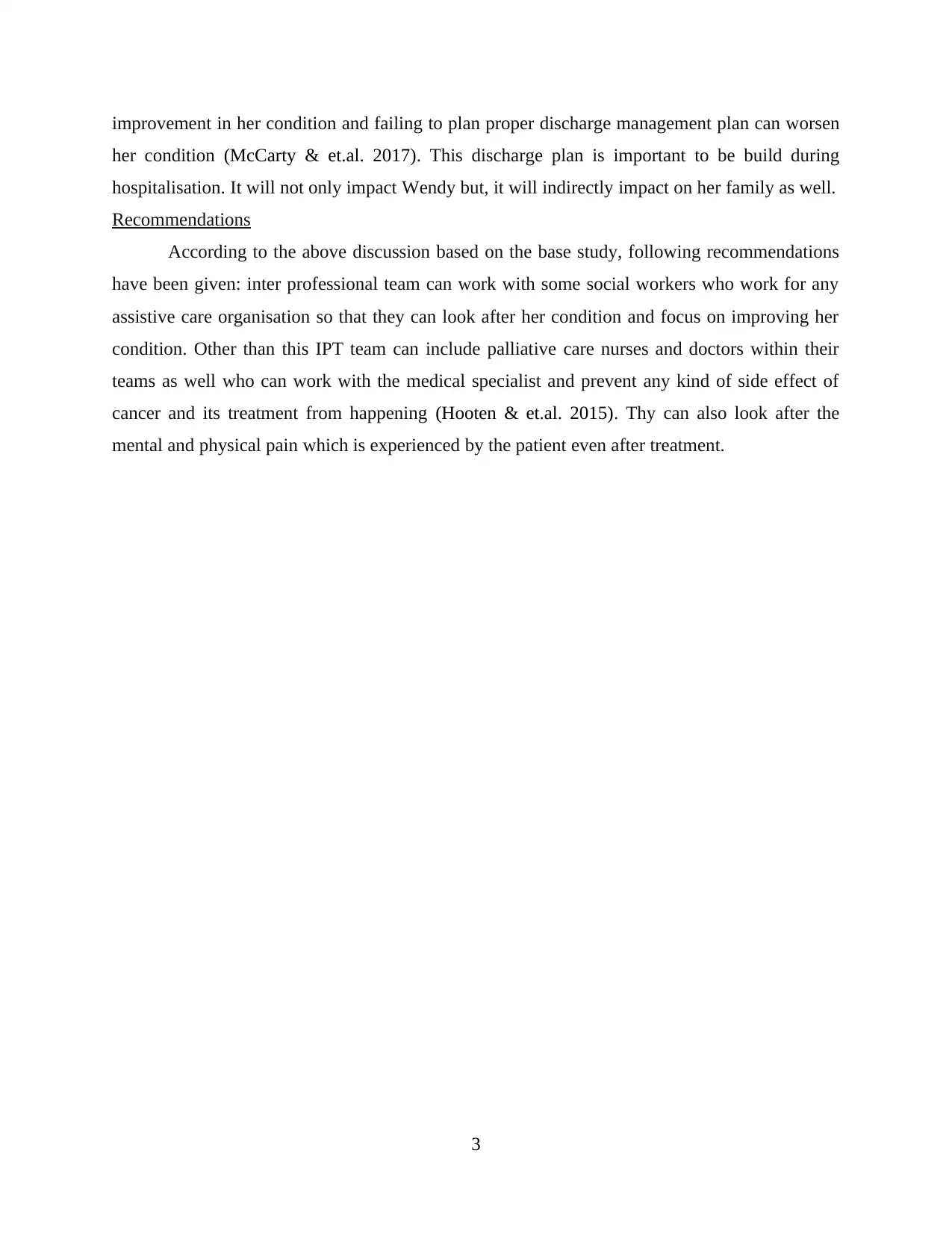
improvement in her condition and failing to plan proper discharge management plan can worsen
her condition (McCarty & et.al. 2017). This discharge plan is important to be build during
hospitalisation. It will not only impact Wendy but, it will indirectly impact on her family as well.
Recommendations
According to the above discussion based on the base study, following recommendations
have been given: inter professional team can work with some social workers who work for any
assistive care organisation so that they can look after her condition and focus on improving her
condition. Other than this IPT team can include palliative care nurses and doctors within their
teams as well who can work with the medical specialist and prevent any kind of side effect of
cancer and its treatment from happening (Hooten & et.al. 2015). Thy can also look after the
mental and physical pain which is experienced by the patient even after treatment.
3
her condition (McCarty & et.al. 2017). This discharge plan is important to be build during
hospitalisation. It will not only impact Wendy but, it will indirectly impact on her family as well.
Recommendations
According to the above discussion based on the base study, following recommendations
have been given: inter professional team can work with some social workers who work for any
assistive care organisation so that they can look after her condition and focus on improving her
condition. Other than this IPT team can include palliative care nurses and doctors within their
teams as well who can work with the medical specialist and prevent any kind of side effect of
cancer and its treatment from happening (Hooten & et.al. 2015). Thy can also look after the
mental and physical pain which is experienced by the patient even after treatment.
3
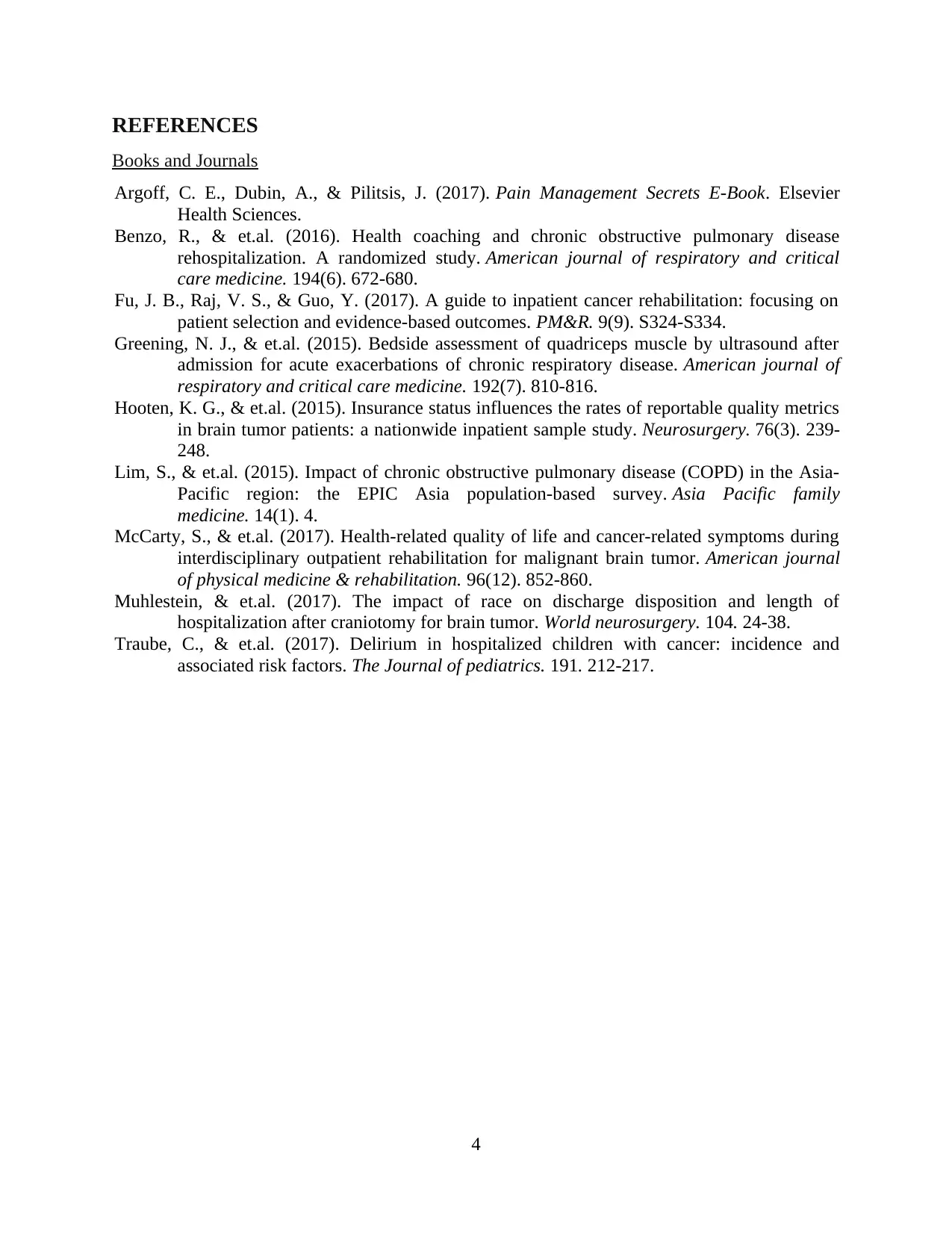
REFERENCES
Books and Journals
Argoff, C. E., Dubin, A., & Pilitsis, J. (2017). Pain Management Secrets E-Book. Elsevier
Health Sciences.
Benzo, R., & et.al. (2016). Health coaching and chronic obstructive pulmonary disease
rehospitalization. A randomized study. American journal of respiratory and critical
care medicine. 194(6). 672-680.
Fu, J. B., Raj, V. S., & Guo, Y. (2017). A guide to inpatient cancer rehabilitation: focusing on
patient selection and evidence-based outcomes. PM&R. 9(9). S324-S334.
Greening, N. J., & et.al. (2015). Bedside assessment of quadriceps muscle by ultrasound after
admission for acute exacerbations of chronic respiratory disease. American journal of
respiratory and critical care medicine. 192(7). 810-816.
Hooten, K. G., & et.al. (2015). Insurance status influences the rates of reportable quality metrics
in brain tumor patients: a nationwide inpatient sample study. Neurosurgery. 76(3). 239-
248.
Lim, S., & et.al. (2015). Impact of chronic obstructive pulmonary disease (COPD) in the Asia-
Pacific region: the EPIC Asia population-based survey. Asia Pacific family
medicine. 14(1). 4.
McCarty, S., & et.al. (2017). Health-related quality of life and cancer-related symptoms during
interdisciplinary outpatient rehabilitation for malignant brain tumor. American journal
of physical medicine & rehabilitation. 96(12). 852-860.
Muhlestein, & et.al. (2017). The impact of race on discharge disposition and length of
hospitalization after craniotomy for brain tumor. World neurosurgery. 104. 24-38.
Traube, C., & et.al. (2017). Delirium in hospitalized children with cancer: incidence and
associated risk factors. The Journal of pediatrics. 191. 212-217.
4
Books and Journals
Argoff, C. E., Dubin, A., & Pilitsis, J. (2017). Pain Management Secrets E-Book. Elsevier
Health Sciences.
Benzo, R., & et.al. (2016). Health coaching and chronic obstructive pulmonary disease
rehospitalization. A randomized study. American journal of respiratory and critical
care medicine. 194(6). 672-680.
Fu, J. B., Raj, V. S., & Guo, Y. (2017). A guide to inpatient cancer rehabilitation: focusing on
patient selection and evidence-based outcomes. PM&R. 9(9). S324-S334.
Greening, N. J., & et.al. (2015). Bedside assessment of quadriceps muscle by ultrasound after
admission for acute exacerbations of chronic respiratory disease. American journal of
respiratory and critical care medicine. 192(7). 810-816.
Hooten, K. G., & et.al. (2015). Insurance status influences the rates of reportable quality metrics
in brain tumor patients: a nationwide inpatient sample study. Neurosurgery. 76(3). 239-
248.
Lim, S., & et.al. (2015). Impact of chronic obstructive pulmonary disease (COPD) in the Asia-
Pacific region: the EPIC Asia population-based survey. Asia Pacific family
medicine. 14(1). 4.
McCarty, S., & et.al. (2017). Health-related quality of life and cancer-related symptoms during
interdisciplinary outpatient rehabilitation for malignant brain tumor. American journal
of physical medicine & rehabilitation. 96(12). 852-860.
Muhlestein, & et.al. (2017). The impact of race on discharge disposition and length of
hospitalization after craniotomy for brain tumor. World neurosurgery. 104. 24-38.
Traube, C., & et.al. (2017). Delirium in hospitalized children with cancer: incidence and
associated risk factors. The Journal of pediatrics. 191. 212-217.
4
⊘ This is a preview!⊘
Do you want full access?
Subscribe today to unlock all pages.

Trusted by 1+ million students worldwide
1 out of 6
Related Documents
Your All-in-One AI-Powered Toolkit for Academic Success.
+13062052269
info@desklib.com
Available 24*7 on WhatsApp / Email
![[object Object]](/_next/static/media/star-bottom.7253800d.svg)
Unlock your academic potential
Copyright © 2020–2026 A2Z Services. All Rights Reserved. Developed and managed by ZUCOL.





